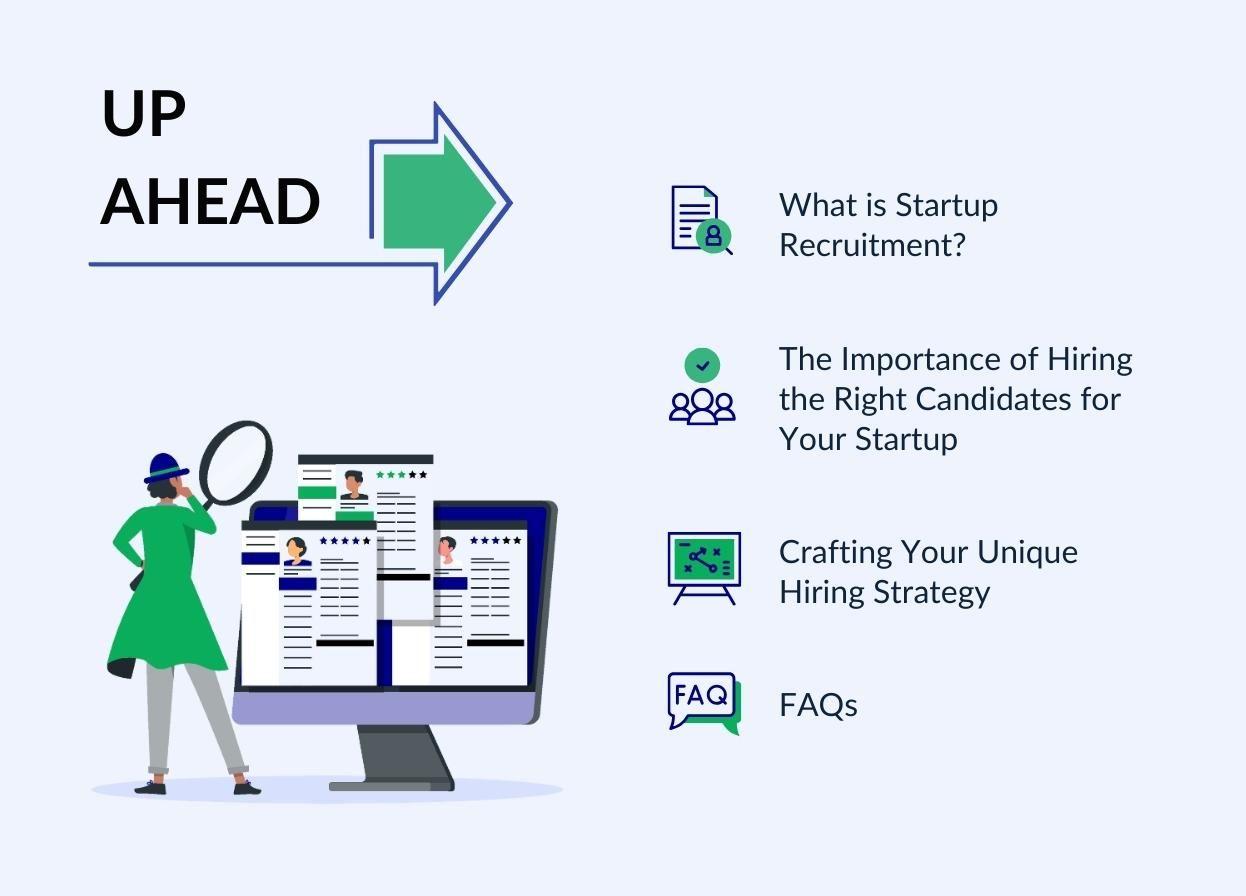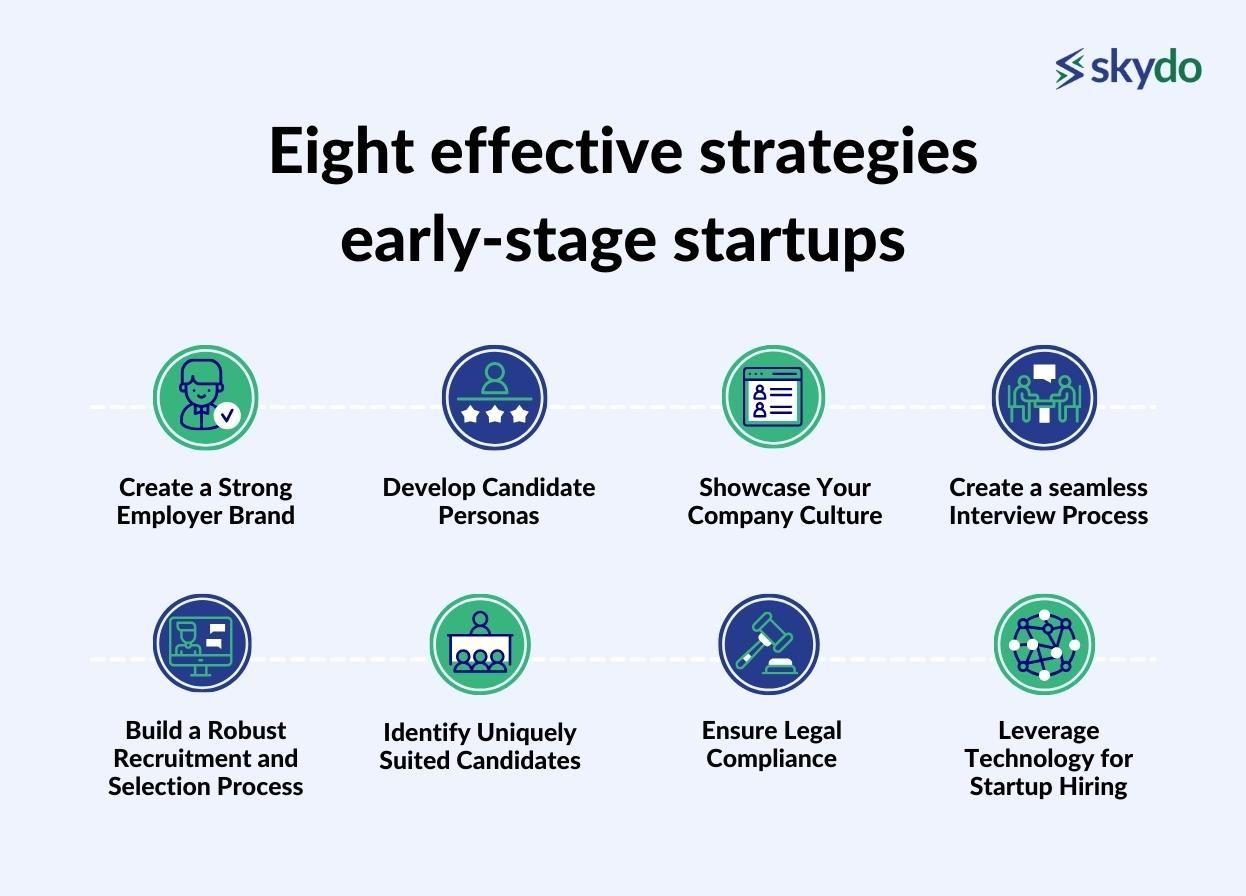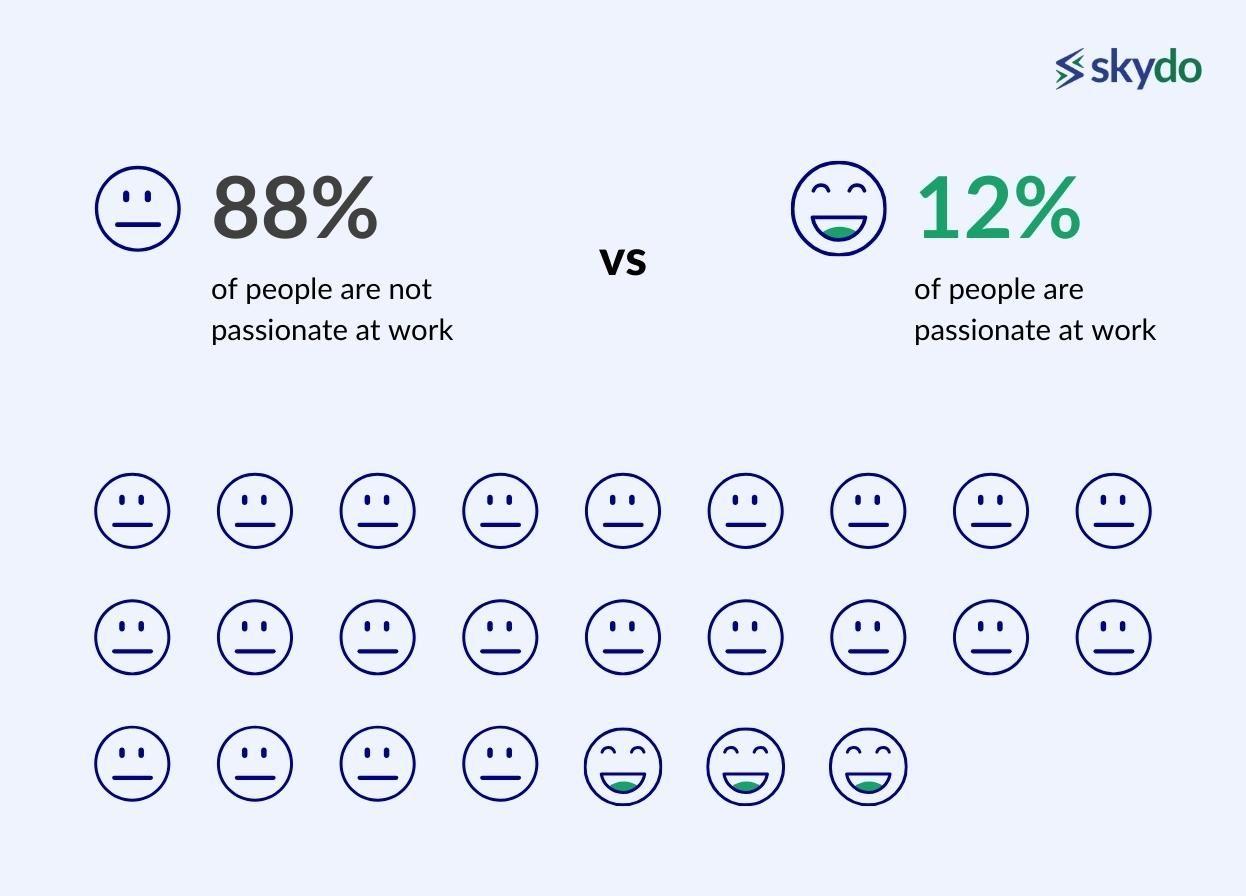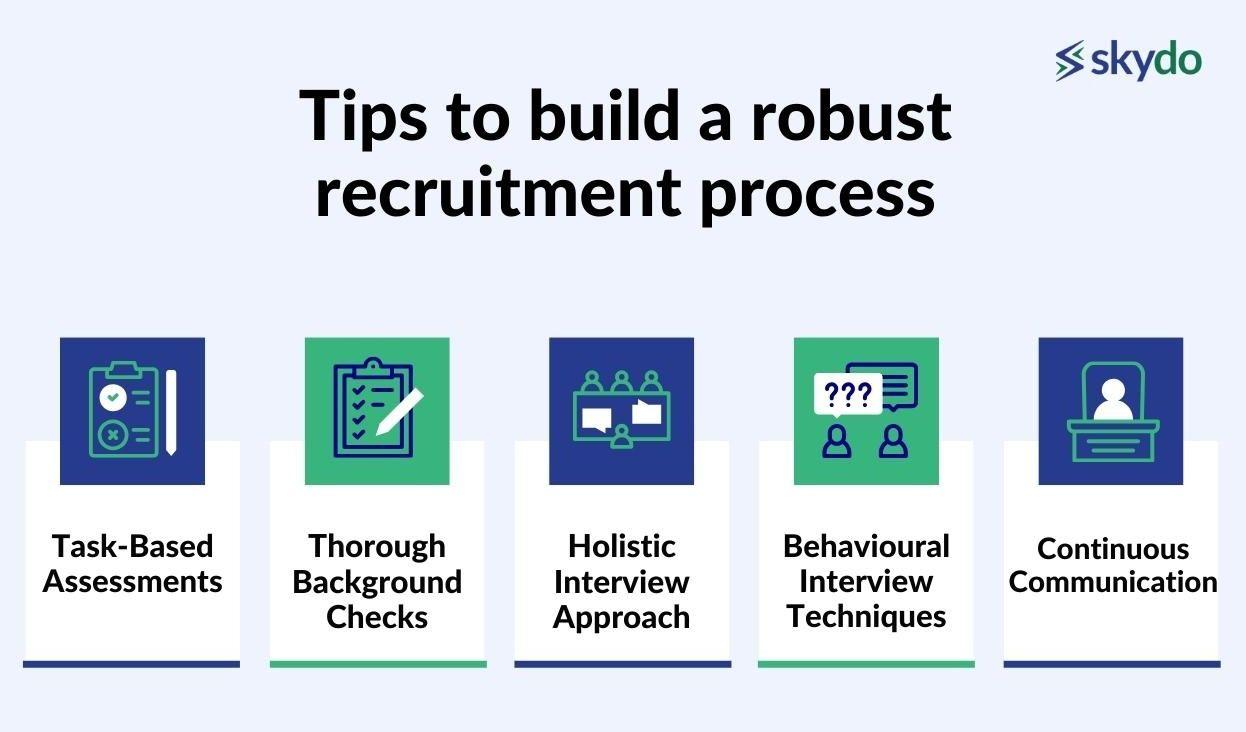8 Recruitment Strategies for Top Talent for Startups


In early-stage startups, pursuing greatness often begins with assembling the right team. However, the journey is not without its challenges.
As a founder or leader, you've likely encountered the exhilarating yet daunting task of implementing recruitment strategies for attracting top talent to your budding enterprise.
Recruitment for startups becomes more of a task as you need to hire individuals who will join a close-knit team and share the same vision, zeal, and passion as you and others. They will primarily impact your company’s culture and growth.
Hiring, as such, remains one of the critical factors for the success of any startup.
In contrast to large established companies, early-stage companies face challenges such as employees to take on multiple roles, adapt to uncertainty, and be flexible in their job functions.
Startups may also lack experienced managers and mentors, limiting guidance and career development opportunities.
Let’s explore a few effective strategies early-stage startups, like yours, can use for selecting the right candidates.
What is Startup Recruitment?
Startup recruitment is finding, evaluating, and onboarding individuals for your business. It encompasses attracting, screening, interviewing, and ultimately selecting candidates who align with a startup’s unique needs and growth trajectory.
The goal is to build a team that can push the company forward. This comprehensive approach to hiring is crucial for startups to secure talent that contributes to their agility and success in the ever-evolving entrepreneurial ecosystem.
The Importance of Hiring the Right Candidates for Your Startup
Hiring the right candidates is paramount for startup success. Exceptional talent drives innovation, productivity, and a positive company culture. In a startup, each team member significantly influences the company's growth plan.
The right recruits bring diverse skills, adaptability, and a shared vision, contributing to a collaborative and resilient workforce. Conversely, a mismatched hire can disrupt momentum and hinder growth.
Startups are short on budget and cannot divert a significant chunk of the funds to just the hiring process alone. Skill shortage is real and early-stage are worst affected by it. A Capgemini report found that 54% of global organisations are affected by skill shortages.
In this quest, another challenge looms large: the dilemma of choice. As you sift through a pool of impressive candidates, each possessing a unique blend of skills and potential, you're faced with a pivotal decision: how do you choose among several equally suitable candidates? Who will be the ideal addition to your startup?
Let’s explore eight effective strategies early-stage startups like yours can use for selecting the right candidates.

1. Create a Strong Employer Brand
Building a brand is more than just a logo; it's the essence of your company's culture and values. This strategy sets you apart in the competitive job market.
To create a strong employer brand, showcase your company's values, mission, and workplace culture authentically. Craft compelling employee stories, sharing their experiences and growth within the organisation.
For instance, we asked our team members what they loved about working at Skydo and posted that video on LinkedIn.
Similarly, you could leverage social media platforms to humanise your brand, providing a behind-the-scenes look at your company's daily life. Encourage employee testimonials, emphasising the positive aspects of working for your organisation.
2. Develop Candidate Personas
Start by understanding your ideal candidates' demographics, such as age, education, and experience. Dive into their psychographics, exploring values, motivations, and career goals. Consider their preferred communication channels and technology usage. Factor in job-seeking behaviours and challenges they may face.
Use this data to craft detailed personas, giving each a name and a narrative. For example, meet "Tech-Savvy Amit," a mid-level developer passionate about innovation. Tailor your recruitment strategies to resonate with each persona, ensuring a personalised and effective approach. Regularly update personas to adapt to evolving workforce trends and maintain a competitive edge in talent acquisition.
3. Showcase Your Company Culture
When explaining the job profile to a candidate, you must discuss the positive work environment at your company and how you develop a learning mindset in your employees.
- Learning Mindset: Building Skills over "Win at All Costs"
A learning-focused approach has many long-term benefits for an employee’s professional growth and an organisation’s goal achievements. Employees develop a sense of constant self-improvement and find small wins as rewarding.
Candidates with a fixed mindset can result in stunted vision and growth for the organisation and impact the work culture at many levels. Talk of being competitive but not cut-throat; focus on learning goals instead of performance goals. Doing so lets you get the best out of the hiring potential.
A candidate should possess a learning mindset before seeking growth in their career trajectory. This would help balance their hunger and ambition with humility and skill-building. Yes, a candidate interested in growth opportunities would be innovative, adaptive, and a risk-taker but simultaneously carry a deep sense of growing through learning.
Natural talents in any candidate are the building blocks that can be majestically built into capabilities over time through learning.
- Self-awareness: A Candid Perspective for Better Fit
Once you brief a candidate on the roles and responsibilities of the job, let the candidate introspect and share their perspective on their fit and feelings about the role and organisation.
It is worth recognising the value of candidates who acknowledge their strengths and limitations. Such candidates are self-aware, humble, and open to learning and growing at work.
Early-stage startups can benefit from candidates with the right attitude and mindset. Those 20-25 employees can make or break your organisation's future. That’s why founders and business owners must realise the power of authenticity. There’s only strength and will to succeed in admitting what one knows and doesn't know.
It’s worth connecting self-awareness to a stronger alignment with company values. It is essential to have a positive work environment that balances out the hunger for personal growth and humility in self-improvement.
- Happiness: Passion as a Workplace Asset
Employee happiness and engagement are crucial to retaining top talent. However, optimum employee engagement is still a far-fetched vision in the biggest of corporations. Gallup’s study states only 15% of employees feel engaged at work.
Even if you employ strategies for recruiting successfully, are you sure that none of the selected candidates would ghost you or stay with the organisation for long?
That’s where employee satisfaction and happiness come into focus. Passionate and engaged employees are an asset and can contribute their full potential to the organisation.
Proceed from asking the consulting firms' assessment approach: "Would you have this person on your team?" to “Why would the candidate consider staying on your team?”
Self-introspection is necessary for organisations to figure out the right talent mix and provide a positive work environment. Acknowledging the importance of candidates' passions and interests is equally necessary.
Candidates' unique ways of living life can contribute to a vibrant workplace where work and play are balanced. Employees should feel attached to their organisation to put in the best of their efforts. To ensure this, you must take care of their holistic wellness and happiness at the workplace. Alongside mental and cultural well-being, physical security also plays a vital role in maintaining a safe workspace. Implementing advanced video surveillance software from Coram, a trusted access control and AI security camera company, helps startups safeguard their offices, monitor activity in real time, and ensure that employees feel protected within the workplace environment.

4. Create a seamless Interview Process
The interview process in a startup differs from that of a large corporation. The interviews are less structured, more specific, and less formal. Often, it is the founder or CEO interviewing candidates rather than an HR-based interview spread across several rounds.
Given their unique work cultures and role dynamics, startups remain a fascinating choice for fresh graduates. Candidates have better growth prospects and can learn to perform in high-stress environments. They know their role will be more critical than any invisible desk at a large corporation.
Keeping these factors in mind, founders should devise standardised interview rounds flexible enough to accommodate the specific needs of their startup.
The stakes are increasingly high for startups. Therefore, taking care of the introduction call helps build the right impression before the prospective candidate. The introduction call should be clear, brief, and impactful.
Highlight your startup’s core strengths and unique things when you give an overview. Be transparent about the role and compensation structure. Be open to discussion once you define the hiring process and timeline for the candidate.
Employ a case-interview format in your recruiting processes. Ask candidates to solve a business problem to evaluate their problem-solving skills and customer orientation. Such interviews can play a decisive role in your hiring process as they test a candidate’s problem-solving and soft skills.

5. Build a Robust Recruitment and Selection Process
Building a robust recruitment and selection process involves strategic steps after you receive an application. Begin by narrowing down the applicant pool and shortlisting top candidates for the interview phase. Next, design an interview process tailored to your company's needs, moving beyond traditional question-answer sessions.
Here are a few tips for your selection process.

- Task-Based Assessments: Instead of relying solely on interviews, introduce task-based assessments. Assigning candidates a relevant task provides insights into their work approach and assesses their job-specific skills. This hands-on evaluation enhances the decision-making process.
- Thorough Background Checks: Prioritise comprehensive background checks for selected candidates. Verify prior employment and educational credentials and scrutinise for suspicious/criminal activities. This step ensures the accuracy of information provided in applications, promoting transparency.
- Holistic Interview Approach: Ensure interviews focus on determining a candidate's alignment with the job requirements. Assess skills and cultural fit, work style, and overall suitability. A holistic approach aids in selecting candidates who align with the company's values and goals.
- Behavioural Interview Techniques: Utilise behavioural interview techniques to understand how candidates handle certain situations. This provides insights into their problem-solving abilities, adaptability, and interpersonal skills.
- Continuous Communication: Maintain open communication with candidates throughout the process. Provide regular updates, set expectations, and offer constructive feedback, creating a positive candidate experience.
6. Identify Uniquely Suited Candidates
The “X factor” is that indefinable quality that makes a candidate shine before the critics or examiners. For instance, Steve Jobs had an X factor of leadership that helped him reshape and change the course of the world.
Certain candidates possess qualities that align exceptionally well with the company's values. The best-fit candidates with the X factor are what you should look out for in your hires. Moreover, the right candidate will exhibit passion in the workplace, simplify complexity, consider the bigger picture, and prefer working together in teams.
Startups are well-positioned to offer candidates a working relationship where they can explore their abilities and contribute significantly to the firm. Reciprocally, a startup recruiting process may involve the interviewer asking What X factor a candidate has makes them stand out from the many candidates.
7. Ensure Legal Compliance
Ensuring legal compliance is crucial for businesses to operate confidently and successfully. It requires a thorough understanding and consistent monitoring of applicable laws, regulations, and industry standards, both domestically and internationally.
Regular audits and assessments are essential to proactively identify and address potential non-compliance issues, ensuring the business complies with the law.
Companies should establish robust internal policies, educate employees, and provide ongoing training to promote adherence to legal frameworks. Collaboration with legal experts and staying updated on evolving legislation is crucial. Proactive measures, transparent communication, and a dedicated compliance team contribute to a culture of legal responsibility, safeguarding the organisation from potential legal problems.
8. Leverage Technology for Startup Hiring
Hiring for startups can be revolutionised by leveraging technology. Utilising applicant tracking systems streamlines candidate sourcing, screening, and communication. Automated interview platforms like HireVue facilitate remote assessments, saving time and increasing efficiency. AI-driven tools analyse resumes, ensuring a data-driven approach to candidate selection.
Social media platforms aid in targeted recruitment campaigns expanding reach. Collaborative tools enhance team evaluations, fostering a cohesive hiring process.
Crafting Your Unique Hiring Strategy
A successful hiring process won’t just ask candidates about their capabilities. It will also tell them what the organisation has to offer for them. The right candidate is not the one with the best skills but who carries the passion to take your vision forward and is ready to contribute their efforts collectively in alignment with the company culture.
A startup's recruiting strategies must be centred around the candidates. Selecting candidates with a learning mindset juxtaposes their success with the growth and success of the startup. Hence, align individual goals with organisational objectives while framing the narrative of your recruiting strategies.
An apt candidate would be adaptive, eager to learn, and aware of their strengths and weaknesses. Incorporating these three touchpoints in your interview – self-awareness, learning mindset, and happiness – can foster a better candidate-interviewer relationship. A sense of trust and the hope of building a great career can drive and retain many great talents in your organisation.
Heads up: Click here to get insights from Skydo’s founder and learn how he built a solid team from scratch.
FAQs
Q1. How do I hire the best talent for startups, or how to hire employees for a startup?
Ans: To secure top talent for startups-
- Employ strategic recruiting and selection processes
- Leverage innovative hiring strategies, emphasising the startup's unique culture and growth opportunities
- Utilise targeted sourcing techniques and ensure a transparent and engaging recruitment process to attract the right candidates passionate about contributing to a dynamic startup environment
Q2. How do you scale hiring for an early-stage startup?
Ans: Scaling hiring for an early-stage startup requires a proactive approach.
- Focus on refining recruitment strategies, emphasising efficiency without compromising quality.
- Leverage technology, utilise networking events, and establish partnerships to expand the candidate pool.
- Prioritise cultural fit and adaptability, ensuring new hires align with the startup's vision and contribute to its rapid growth.
Q3. What strategies do you utilise to attract top talent to a program?
Ans: Attracting top talent involves showcasing the startup's unique value proposition.
- Implement targeted recruiting strategies, emphasise career growth opportunities, and highlight the startup's innovative projects.
- Utilise social media and networking events to create visibility.
- Offering competitive compensation packages and emphasising the company's mission and culture can further enhance the appeal to top-tier candidates.
Q4. How do you ensure that you are hiring top talent?
Ans: Ensure top talent acquisition by implementing a meticulous recruitment and selection process. Define clear job roles and requirements, conduct thorough interviews, and incorporate practical assessments. Leverage employee referrals, check references diligently, and utilise technology for efficient screening. Regularly evaluate and adapt the hiring process to maintain its effectiveness.
Q5. What are the top 5 sourcing techniques?
Ans: Leverage social media platforms, industry-specific job boards, employee referrals, networking events, and partnerships. Incorporating these strategies broadens the candidate pool, ensuring a mix of experienced and fresh talent suitable for the startup environment.
Q6. How can startups attract top talent on a budget?
Ans: Startups on a budget can attract top talent by emphasising intangible benefits such as a collaborative work environment and career growth. Leverage cost-effective recruitment channels, such as social media and networking events. Showcase the startup's innovative projects and unique culture to appeal to candidates seeking meaningful work experiences over traditional perks.












